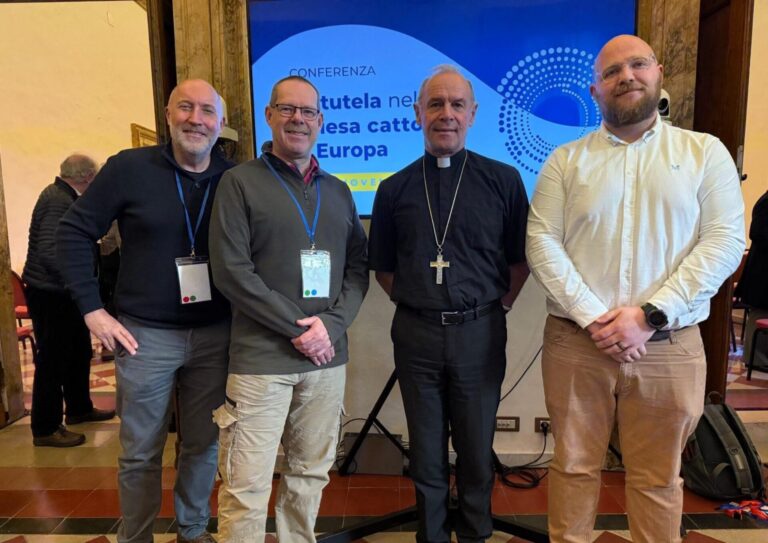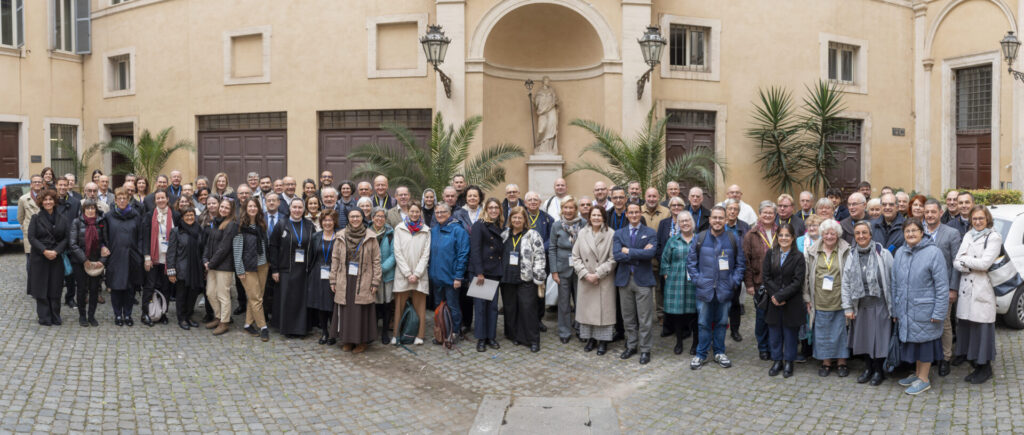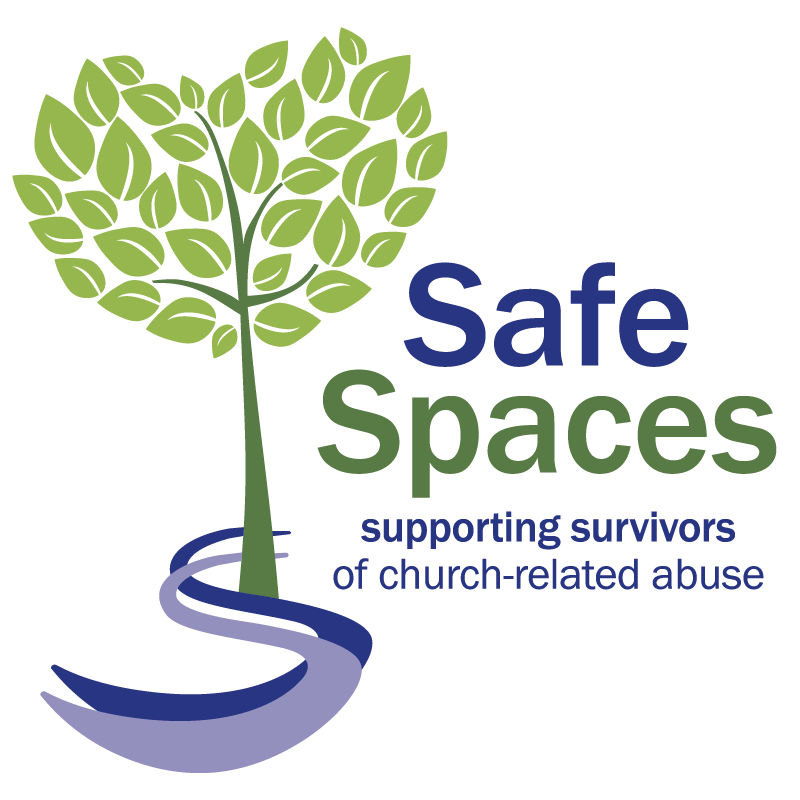
L-R Mick Walker, Director of Safeguarding for Our Lady of Charity of the Good Shepherd.
Steve Ashely, CEO of the Catholic Safeguarding Standards Agency.
Bishop Paul Mason, Bishop to the Armed Forces.
Martin Christmas-Nelson, Safe Spaces Manager
A Landmark Gathering for the Protection of Minors and Vulnerable Adults
The first-ever European conference dedicated to the protection of minors and vulnerable adults brought together 100 delegates from 25 countries. Participants included survivors, Archbishops, Bishops, Religious leaders, laypeople, academics, independent experts, and others, all committed to safeguarding those at risk. The event also marked the introduction of the Memorae initiative, a new endeavour formed by the Pontifical Commission for the Protection of Minors (PCPM), reinforcing the Church’s commitment to child protection.
Addressing Survivor Trauma and Emotional Complexities
One of the significant aspects of the conference was the open dialogue between survivors and religious psychotherapists. A crucial discussion arose around the complex emotions survivors often experience towards their abusers. One survivor shared their struggle of wanting more children but finding it difficult to engage in an intimate relationship, even with an understanding partner. These deeply personal conversations emphasised the importance of trauma-informed support systems that recognise the long-term emotional impact of abuse.
A Slovakian psychotherapist explored the management of sexual desires and victim responses to trauma, both in the context of the inner self and broader social structures. A key question was raised regarding the creation of a safe buffer zone for survivors of religious trauma—one that allows them to process their experiences without being abandoned or retraumatised by overly authoritative interventions. This discussion highlighted the delicate balance between offering support and ensuring survivors feel neither pressured nor neglected.
Building Safe Societies in Post-Conflict Regions
A critical area of focus was safeguarding children in post-conflict societies, particularly in Bosnia and Herzegovina, where ethnic and religious divisions persist. Delegates examined how safe social systems and youth environments can be created to prevent the exploitation of children in communities fractured by religious and ethnic differences. The discussion included multifaith initiatives, with ongoing work in partnership with JSAS and other religious organisations. The goal is to build bridges between Muslim, Orthodox, and Catholic communities to ensure a unified approach to child protection.
The First PCPM Report and a Survivor-Centred Approach
The conference also saw the presentation of the first PCPM report, sparking essential discussions on the methodologies used to reach out to survivors and the support structures needed to manage these interactions effectively. An insightful analogy was shared: survivors are like individuals at the scene of an accident—those who are silent may be suffering the most and, therefore, require the most careful and compassionate attention.
Dr. Irma Espinoza from Mexico contributed her expertise, discussing how charities and independent survivor organisations can help amplify the voices of quieter survivors, ensuring their needs are prioritised. A follow-up conversation is scheduled to explore how this survivor-first approach can shape the second report, providing a more inclusive and representative account of survivor experiences.
A Collective Mission for the Future
The final day of the conference culminated in the formation of a working group tasked with drafting a mission statement and outlining a strategic direction for future safeguarding efforts. MARTIN CHRISTMAS – NELSON was elected as scribe and spokesperson for this diverse group, which included Bishops, academics, charity CEOs, and safeguarding leads from England, Ireland, Ukraine, and Czechia.
The group’s statement underscored the necessity of collaboration:
“Safeguarding, and learning alike, do not happen in isolation or alone. We are a collective of local, regional, national, and international experts. We need to recognise that nobody moves forward alone, but as a whole. Collaboration is needed to learn from not only our individual successes but our collective failures at all levels, by engaging in dialogue and peer-reviewing good and bad practices first at the local level, then at every other level, concluding with cooperation between the established western churches and the youthful eastern churches, and beyond. The commission needs to ensure that power is given equally to all voices and to empower and amplify positive practice.”
The statement also emphasised the necessity for context-specific safeguarding strategies:
“Safeguarding cannot be franchised or transplanted between cultures, but rather grows in the gaps between our knowledge and practice when we learn to communicate in a common language of protection and safety. We cannot do this alone.”
A Call to Action
This groundbreaking conference laid the foundation for continued dialogue and collaboration in the protection of minors and vulnerable adults. With the introduction of the Memorae initiative and a renewed commitment to survivor-centred methodologies, the work ahead is clear: safeguarding efforts must be collective, survivor-focused, and adaptable to different cultural contexts. The global community must work together to ensure that protection, healing, and justice remain at the forefront of our efforts.


Photograph by Lorenzo Iorfino
